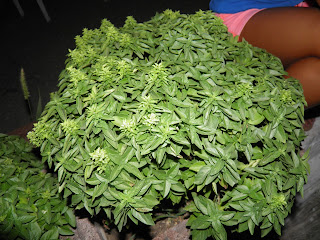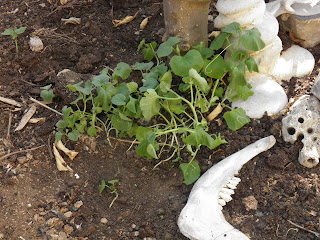Greek cooking uses much the same ingredients as the other three mediterranean countries Italy, France and Spain. The basics of their cooking are similar yet each one is so different and unique.
Greek food also has flavours of its neighbours in the Balkans and the Middle East.
Don't think, after reading some of my earlier posts, that all we eat is pig and offal. Most of our meals, especially now in this heat, are vegetable based. We may have fish twice a week and meat on Sundays and special occasions. Beans and lentils are a big part of our diet.
Basics which you will find over and over in Greek dishes are of course extra virgin olive oil along with lemon juice and fresh or fresh dried oregano. Those are the big three but wine, runny natural honey, olives pickled or salted, thick strained yoghurt or the sour tasting sheep or goat's yoghurt, all sorts of greens and the twice baked bread which is like a hard dried rusk. The paximadi (rusk) must be quickly dipped in water to soften it and is often eaten drizzled with olive oil and topped with grated tomato and feta or crumbled in a salad where it soaks up all the juices.
Our thyme, oregano, olives, lemons, wine, oil, eggs, honey, greens and feta all come from local fields or farmers.
Greeks eat food that is fresh and preferably from suppliers they know. They make what they can at home, including various pastas when the goats have surplus milk and chickens are laying.
Feta - goat or sheep's cheese. We have a friend on the island with a large herd of goats who makes goat cheese and we buy mostly from his family. NZ makes a nice tangy feta-type cheese. It is made from cow's cheese and is therefore a slightly yellow colour. The name 'feta' is protected under European law and can only be applied to goat and sheep cheese made in Greece. Gorgonzola, champagne, cognac, roquefort and Melton Mowbray pies are other protected products.
This is what true feta cheese looks like. Homemade, straight from the goat. Look at the holes.
Retsina - this used to be virtually the only wine available in Greece when I arrived in 1976. It was bought mainly by the litre from the local grocer or taverna. Retsina is so named because of the resin taste that came from the lump of pine resin put in each barrel to kill any unwanted bacteria. The first glass was rather 'brisk' but the more you drank the better it got. A glass of iced retsina after a plate of lamb helped to cut through all that fat. Nowadays it is hard to find.
No hummus. This is a Middle Eastern dip made with chick peas and tahini (sesame paste). It is just becoming popular here.
No basil. Until recently basil was simply grown in a pot for its sweet smell and to keep away the flies. My mother-in-law would never have used it for cooking. Basil has also come into fashion. I use a combination of parsley, mint and basil in most vegetable dishes with fresh tomato.
Halloumi is a cheese from Cyprus and is best grilled.
Mediterranean memories
Italian cooking .
The best pizza I have eaten in Italy was with potato and I have never seen it since or found a suitable recipe. Our first meal in Italy was plain spaghetti with cheese on top and I can remember even now the waitress showing us how to eat it with the use of a spoon. Limoncello I make when we have extra lemons but I prefer the true Italian which travellers have brought us.
French food.
I ate steak tartare but once. I ordered it thinking I was going to be served a sizzling steak. Instead I got raw minced meat and garlic. I ate it, though I don't know how and two hours later was sitting very queasily on a plane bound for London. Frog legs I have eaten in Greece and they are delicious but not much to them, those poor frogs have skinny little legs. Snails are also a yummy greek dish but not quite like the superbe escargot. Greek snails are smaller, usually in a tomato sauce and have to be loudly sucked from their shells.
Spain.
I have been tipsy on Spanish sherry on a few occasions (in my youth) but haven't seen or tasted it in about 40 years. Gazpazzo I ate on my first night in London 40 odd years ago. I had no idea what it was then and what a disappointment. Cold soup. Sangria is becoming popular here at summer weddings. It has been served before the dinner at all the weddings we've been to recently.
Moussaka. Traditionally this dish consists of layers of fried aubergine, potato and zucchini followed by a thick layer of stewed minced meat and tomatoes and topped with a bechemal sauced flavoured with lots of nutmeg. My first attempt at moussaka was a bit of a disaster. I fried the aubergine and zucchini but put in slices of raw potato. The potato of course was still hard after its half hour cooking . One of my first failures.
Now I boil the potatoes whole and then slice them, grill the aubergine and zucchini, use very little oil and freshly grated tomatoes to stew the meat and the bechamel sauce is made from low fat milk. I still make sure the nutmeg is the star. The overall dish is much lighter for this summer heat. It is wonderful cold the next day but irresistible piping hot, sloppy with rich tomatoey juices, straight out of the oven.
A vegetarian version using a fresh tomato sauce instead of the mince is great in the summertime when you want something a little lighter.
Moussaka is not Greece's national dish and neither is the greek salad.
THIS is the Greek national dish, fassolatha. It is a soup using dried beans soaked overnight (never tinned), carrots, celery and tomato. In the colder north they add a hot pepper or two and so do we in the winter time. It is a great dish to warm the bones when snow is threatening to fall (happens a few times in the winter believe it or not) and it is the favourite of every greek. In the summertime we eat the beans in a oil and lemon vinagrette with lots of thin sliced onion and parsley. This version is called 'beans piaz'.
Stuffed tomatoes and peppers.
A greek salad, slices of white feta cheese, bread and a cold beer.
One kind of souvlaki. Meat on a skewer grilled over the fire, usually pork or chicken
And the Other Kind, gyro meat (lamb) rolled up in pita bread with onion, tomato, tzatziki and fried potatoes. Now days you can also get chicken gyro. The pita bread is stuffed with chicken, a pink sauce (called 'sos') and shredded lettuce.
Feta grilled with tomato and green pepper, olive oil and paprika, wrapped in tin foil and grilled on the bbq.
Briam - greek ratatouille. A rich mix of potatoes, aubergines and zucchinis, fresh grated tomato, mint, parsley, garlic, loads of olive oil with a little crumbled feta cheese
Green beans and potatoes (fassolakia me patates). Serve with feta cheese.
Kalamarakia stewed with tomatoes and ouzo. The kalamari is guaranteed to be soft and tender. The sauce has a tang of ouzo and dill.
KALI OREXI


























































































